|
|
|
Sort Order |
|
|
|
Items / Page
|
|
|
|
|
|
|
| Srl | Item |
| 1 |
ID:
133960
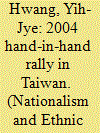

|
|
|
|
|
| Publication |
2014.
|
| Summary/Abstract |
This article investigates how a collective memory of trauma was produced in the course of commemorating the 2-28 Incident in the context of the 2004 election campaign, and how this memory production led to the parallel formation of a Taiwanese national identity. The 2-28 Hand-in-Hand Rally was designed to remember the 2-28 Incident as a historical trauma in order to be forgotten. The remembering of the 2-28 Incident must be regarded as a constructive process as opposed to a retrieval process. The memory of the 2-28 Incident was selectively constituted in favor of sovereign power.
|
|
|
|
|
|
|
|
|
|
|
|
|
|
|
|
| 2 |
ID:
105348
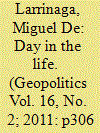

|
|
|
|
|
| Publication |
2011.
|
| Summary/Abstract |
This article shares its title with a Beatles' song in which John Lennon wove together several newspaper stories from a particular day to create "A Day in the Life". As with the idea behind Lennon's lyrics I would like to provide a tomogram of global governmentality by using a specific day's events to examine transformations in the current world (dis)order. On November 20th, 2003, several events occurred, including the bomb attack on the British Consulate and the HSBC bank headquarters in Istanbul; a presidential visit by George W. Bush to London accompanied by antiwar protests; suicide bombings in Kirkuk and Ramadi; an evacuation of staff from the White House due to a "blip" on a radar screen rather than a plane; anti-FTAA protests and clashes with police in Miami; all these events can be used as a barometer to examine global governmentality and the current predicament of the representation of global order. This analysis is framed within the broader context of a questioning of the "eventness" of the event, agency and territoriality in contemporary world politics, as well as the process and significance of dating in representing global order. In doing so it attempts to highlight the tensions between global politics understood and articulated from a sovereign optic and an understanding of global politics as a site of governmentality and transversal struggles in a world where "9-11" and the "war on terror" provide the fundamental markers of current representations of contemporary global social order.
|
|
|
|
|
|
|
|
|
|
|
|
|
|
|
|
| 3 |
ID:
187076


|
|
|
|
|
| Summary/Abstract |
The notion of digital sovereignty, also often referred to as technological sovereignty, has been gaining momentum in the European Union’s (EU) political and policy discourses over recent years. Digital sovereignty has come to supplement an already substantial engagement of the EU with the digital across various security policy domains. The goal of this article and of the overall Special Issue is to explore how the discourse and practices of digital sovereignty redefine European security integration. Our core argument is that digital sovereignty has both direct and indirect implications for European security as the EU attempts to develop and control digital infrastructures (sovereignty over the digital), as well as the use of digital tools for European security governance (sovereignty through the digital). It is thus essential to further explore digital sovereignty both in terms of European policies and of a re-articulation of sovereign power and digital technologies – what we suggest calling digital/sovereignty.
|
|
|
|
|
|
|
|
|
|
|
|
|
|
|
|
| 4 |
ID:
130789
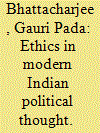

|
|
|
|
|
| Publication |
2014.
|
| Summary/Abstract |
Political _thought is concerned with the state, and the sovereign power of the state is legally unlimited, though it is not arbitrary. It is exercised with the objective of realizing some interest of the state. With the rise of the concept of democracy there arose, not only the importance of the individual but also the long struggle between state sovereignty on the one hand, and individual freedom on the other, ultimately giving rise to the concept of democracy. Democracy does not mean s-imply majority rule. It implies majority rule with full rights of all. The simple view of majority rule gave rise to the misleading concept of democratic dictatorship, and in a democracy an individual, even if he becomes a minority of one, is entitled to enjoy all the rights embodied in the constitution. Democracy therefore implies rights of all and rule by the majority opinion as ascertained periodically.
|
|
|
|
|
|
|
|
|
|
|
|
|
|
|
|
| 5 |
ID:
086331
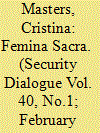

|
|
|
|
|
| Publication |
2009.
|
| Summary/Abstract |
This article inquires after women with whom we have seemingly become intimately familiar in the `war on/of terror'. On one hand, it asks after women such as Jessica Lynch and Lynndie England, examining how US female soldiers have been represented in the `war on/of terror'. On the other hand, it also inquires after some women we do not know at all - women who have largely remained faceless, nameless, figural, reduced to the snapshot of the veil - the women on behalf of whom this war is claimed to be waged. In so doing, it asks the question: What do any of these women have in common? The article explores how women in the `war on/of terror' have in common their silence, erasure and radical exclusion, in varied degrees, from politics. This has been effected through particular representational politics wherein women have been written over and against one another - American women over and against Afghan and Iraqi women, Jessica Lynch over and against Lynndie England. Accordingly, we fail to make connections across difference, and never ask after that which appears at the margins of the text, at the edges of the screen, on the borders of the photograph. This article, therefore, seeks to ask after these margins, edges and borders. It seeks to ask after femina sacra.
|
|
|
|
|
|
|
|
|
|
|
|
|
|
|
|
| 6 |
ID:
092434
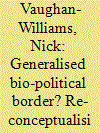

|
|
|
|
|
| Publication |
2009.
|
| Summary/Abstract |
This article is a response to calls from a number of theorists in International Relations and related disciplines for the need to develop alternative ways of thinking 'the border' in contemporary political life. These calls stem from an apparent tension between the increasing complexity of the nature and location of bordering practices on the one hand and yet the relative simplicity with which borders often continue to be treated on the other. One of the intellectual challenges, however, is that many of the resources in political thought to which we might turn for new border vocabularies already rely on unproblematised conceptions of what and where borders are. It is argued that some promise can be found in the work of Italian philosopher Giorgio Agamben, whose diagnosis of the operation of sovereign power in terms of the production of bare life offers significant, yet largely untapped, implications for analysing borders and the politics of space across a global bio-political terrain.
|
|
|
|
|
|
|
|
|
|
|
|
|
|
|
|
| 7 |
ID:
120971
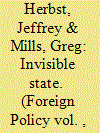

|
|
|
| 8 |
ID:
139495
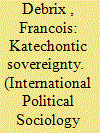

|
|
|
|
|
| Summary/Abstract |
At its core, security is obsessed with the survival of the sovereign order. Security tends to see the sovereign's existence as threatened by agents whose purpose is to challenge the life of the sovereign. In this article, I mobilize a theological language about the relationship between sovereignty and security to grasp the place that the question of life versus death, the fact of sovereign violence, and the problem of temporality occupy in past and present modalities of security. The notion of sovereign restraint, captured by the theological concept of katechon, is introduced to suggest that the politics of security is dependent upon a fundamentally violent, uncompromising, and often terrorizing objective: to keep at bay forces of temporal finitude seen as disorder or chaos. Forces of temporal finitude that refuse to abide by the belief in the sovereign's infinity can be described as the eschaton or as agents of eschatological time. Katechontic sovereignty, the sovereign practice intent on holding off finite ends (and on casting away agents of eschatological “terror”), is generative of security operations that involve decisions over life and death, matters of biopolitics versus necropolitics, and encounters between the ontological vulnerability of the sovereign and “terrorizing” agents.
|
|
|
|
|
|
|
|
|
|
|
|
|
|
|
|
| 9 |
ID:
127057


|
|
|
|
|
| Publication |
2013.
|
| Summary/Abstract |
This study draws upon the insights of Michel Foucault to examine the contemporary immigration industrial complex in the United States. We focus on the involvement of private prison corporations in this complex, as well as the factors that have been essential to its creation and that perpetuate its continuance. We argue that four key aspects of the system (the legal apparatus, worldviews/ideas, private corporations, and webs of influence) converge to create an immigration industrial complex and that this complex functions as an economy of power that works to manage the existing system and discourages fundamental reform.
|
|
|
|
|
|
|
|
|
|
|
|
|
|
|
|
| 10 |
ID:
148124
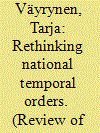

|
|
|
|
|
| Summary/Abstract |
How the past is remembered is fundamental to the production and reproduction of postwar sovereign political power. However, Internation Relations’ (IR) explicit interest in the practices of remembrance, and particularly in time remains a relatively new one. This article seeks to show how Jacques Rancière’s discussion of temporality, subaltern history, and politics – which allows the study of parallel and enmeshing temporal universes – contributes to the IR literature on time. In this view, when speech is acquired by those whose right to speak is not recognised they can produce temporalities that disturb hegemonic representations of time constellations and reorganise the nation’s relationship to its past. The article analyses the moment of Kaisu Lehtimäki’s telling her war story in public, and understands it to be a material and symbolic event that shatters the hegemonic distribution of the Finnish postwar national history and truth.
|
|
|
|
|
|
|
|
|
|
|
|
|
|
|
|
| 11 |
ID:
077878


|
|
|
|
|
| Publication |
2007.
|
| Summary/Abstract |
The shooting of Jean Charles de Menezes in Stockwell Station, South London, on 22 July 2005, was described as a "tragic mistake" by Metropolitan Police Commissioner Sir Ian Blair. This framing of the killing has come to dominate responses to it in the mainstream media. However, such a framing stymies critical questioning about what happened and colludes in the reproduction of a particular framework of understanding within which sovereign power has retrospectively valorized his death. By contrast this article reads the shooting as one of multiple responses of the British state to the bombings of the London transport network on 7 July 2005 and locates Menezes' death within the broader context of the global "War on Terror." Rather than a "mistake," the author argues that the shooting is symptomatic of systemic features of Western politics and in particular innovations in the ways sovereign power attempts to secure the spatial and temporal borders of sovereign political community
|
|
|
|
|
|
|
|
|
|
|
|
|
|
|
|
| 12 |
ID:
084018
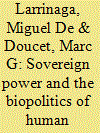

|
|
|
|
|
| Publication |
2008.
|
| Summary/Abstract |
This article examines the manner in which the human security discourse enables a dual exercise of sovereign power and biopower. Drawing from the work of Michel Foucault and Giorgio Agamben, it argues that human security contributes to this dual exercise by conceptualizing a form of life rendered amenable to biopolitical technologies and rationalities while simultaneously defining the conditions of exceptionality that assist in sovereign power's ability to authorize international interventions meant to secure human life. This frame of reference is then mobilized to read the human security discourse within the broader developments of the concept of security from the immediate postwar period to the post-9/11 moment. It is argued that the human security discourse informs the current biopolitical networks of world order and often works in conjunction with - rather than against - the global exercise of sovereign power made evident by the `war on terror'.
|
|
|
|
|
|
|
|
|
|
|
|
|
|
|
|
| 13 |
ID:
156837
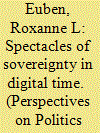

|
|
|
|
|
| Summary/Abstract |
The ISIS videos staging the executions of James Foley and Steven Sotloff are usually understood as devices to deter, recruit, and “sow terror.” Left unanswered are questions about how these videos work; to whom they are addressed; and what about them can so continuously bring new audiences into existence. The evident durability of ISIS despite the imminent defeat of its state, coupled with the political impact of these particular videos, make these questions unusually urgent. Complete answers require analysis of the most understudied aspect of the videos that also happens to be vastly understudied in US political science: the visual mode of the violence. Approaching these videos as visual texts in need of close reading shows that they are, among other things, enactments of “retaliatory humiliation” (defined by Islamists) that perform and produce an inversion of power in two registers. It symbolically converts the public abjection of Foley and Sotloff by the Islamist executioner into an enactment of ISIS’ invincibility and a demonstration of American impotence. It also aims to transpose the roles between the US, symbolically refigured as mass terrorist, failed sovereign, and rogue state, and ISIS, now repositioned as legitimate, invincible sovereign. Such rhetorical practices seek to actually constitute their audiences through the very visual and visceral power of their address. The affective power of this address is then extended and intensified by the temporality that conditions it—what I call digital time. Digital time has rendered increasingly rare ordinary moments of pause between rapid and repetitive cycles of reception and reaction—moments necessary for even a small measure of distance. The result is a sensibility, long in gestation but especially of this time, habituated to thinking less and feeling more, to quick response over deliberative action.
|
|
|
|
|
|
|
|
|
|
|
|
|
|
|
|
| 14 |
ID:
075770
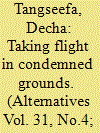

|
|
|
|
|
|
|
|